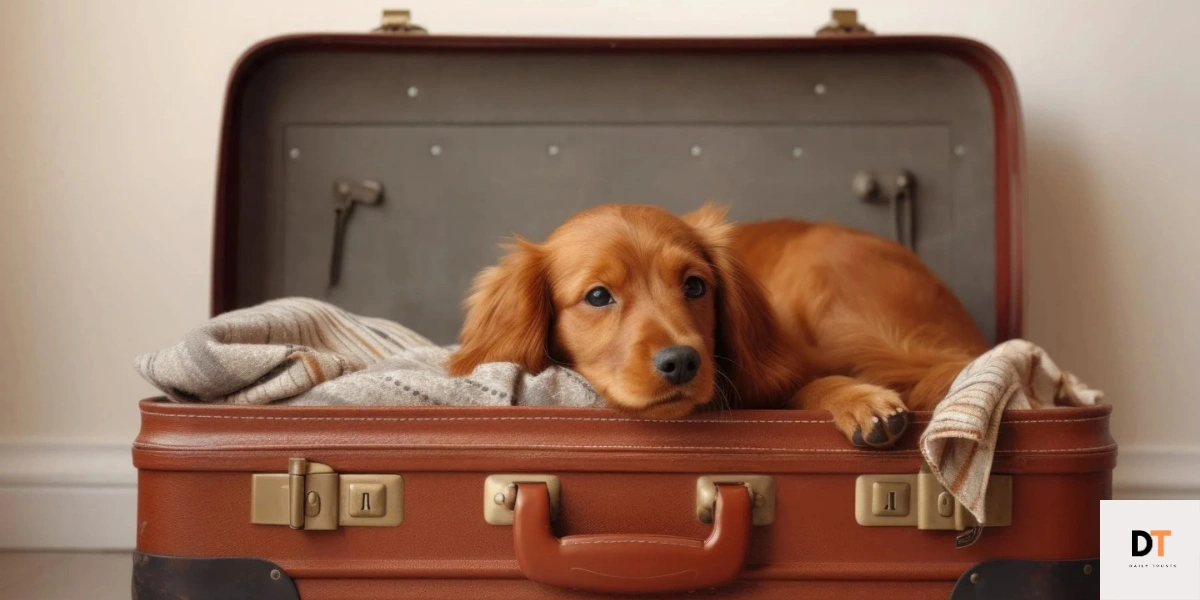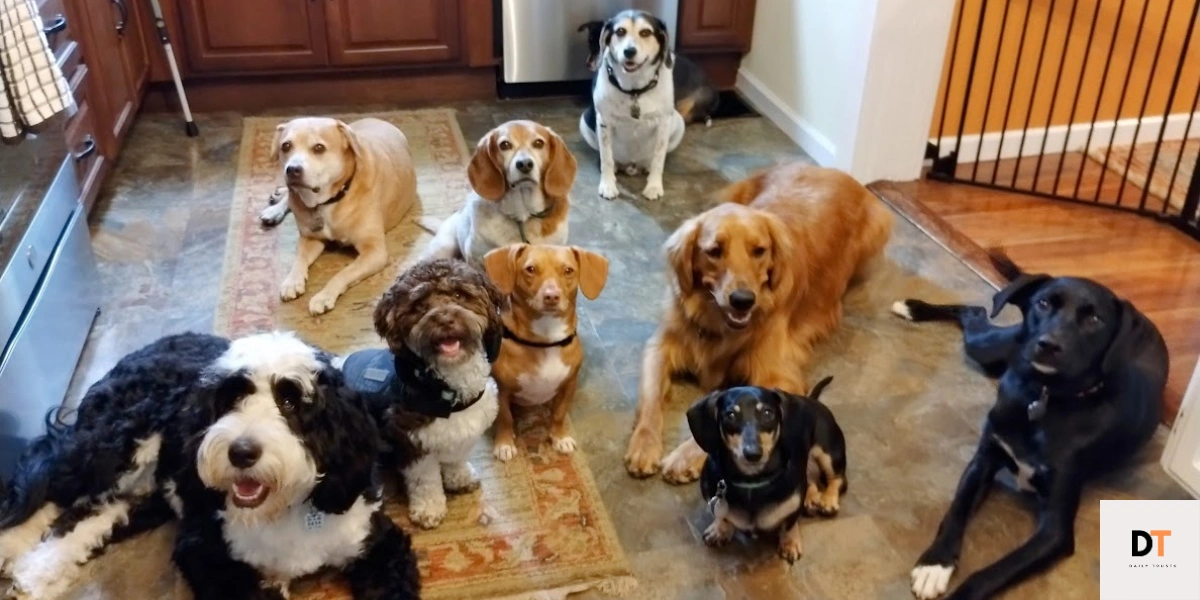Boarding Your Dog For The First Time? Here’s Everything You Need To Know!
It can be emotionally and physically taxing to board your dog for the first time. Worrying about whether your dog will be content and receive the attention they need can also make your trip less enjoyable. Doing your homework and being prepared are the keys to ensuring that you and your dog have a fantastic experience. Here are some secret suggestions to ensure that you and your dog have a stress-free trip if you are thinking about boarding your dog for the first time.
Also Read:
Cristian Fernandez: A Tragic Story of Violence and Redemption
Puppies First Visit
Always start puppies with brief visits. Depending on the puppy’s age, we might suggest starting with visits that last four hours, or half a day. A tiny puppy’s snack or lunch should always include something from home. You are welcome to bring your puppy’s crate if you are crate training them, and we will set it up in the suite exactly like you would at home. Our suggested puppy acclimation schedule is listed below:
- Your puppy will not be staying during this visit, so make an appointment to stop by and finish the paperwork.
- Although a half-day visit is the ideal starting point, we understand that work schedules for families sometimes make this impossible. If needed, we can start with a full-day visit. Please bring your puppy’s lunch or snack item and something from home on your first visit.
- Multiple visits (three to four) spaced one week apart.
- The first brief overnight stay should preferably involve putting the puppy off between 3 and 4 pm and picking them up early the following day. For the first overnight, it is encouraged to bring items from home.
- Routine overnight visit: a routine overnight visit involves being picked up by noon the next day and being sent off earlier in the day.
Many puppies have adapted quite well to this timetable, which also boosts your puppy’s self-esteem. A key component of puppy growth is socialization; we want your puppy to grow up to be a happy, self-assured, and well-rounded dog. Your puppy will benefit greatly in the future if you take the time to carefully expose them to new situations.
Picking The Right Facility For Your Dog

Every pet is distinct so choosing the best kind of facility for them requires careful thought. The needs of your pet should be taken into account when choosing a boarding facility. Do your research online to identify a reputable facility that provides the services your pet needs. For instance, daycare and enrichment programs are crucial if your dog is energetic, or a veterinarian’s office would be a better option if your dog has serious illnesses. Once you’ve narrowed down your options, make sure you meet the personnel and take a tour of the facilities. While there, inquire about steps, requirements, expenses, and any worries you may have.
Why Should You Prepare Your Dog for Boarding?
Dogs boarding in a kennel for the first time may find the experience awful. Even dogs who enjoy visiting dog parks or pet shops might feel anxious when left alone overnight. Getting your dog ready in advance aids in their physical and mental adjustment to the new surroundings, routines, and possible housemates. This results in a more tranquil stay and reduced stress levels. Knowing that you eased the transition also provides you peace of mind.
Before You Board Your Dog
You should think about whether your dog is a good fit for boarding conditions. Your dog must be socially adept if they attend the facility’s daycare during the day. Seek out a boarding facility that keeps dogs apart or hire a pet sitter to stay in your house if your dog doesn’t like being around other dogs.
Dogs with separation anxiety require extra preparation before being boarded, so it can be very beneficial to spend time at the new facility to acclimate and get to know the staff. Since every dog is different, matching the amenities of a boarding facility with your dog’s needs will help to ensure a successful stay. Select a facility that allows trial visits and is prepared to invest the necessary time to make your dog feel more at ease.
Book Your Appointment in Advance
It takes time for your dog to become used to their new pals. When you discover the ideal facilities, it’s possible that others have discovered it too! Don’t take the chance of discovering they are unavailable at the last minute. To ensure there are seats available, reserve your dog’s vacation in advance. particularly if it falls during a holiday.
What to Look For in a Boarding Facility?
Asking about the dog boarding standards during a visit is the best method to evaluate a boarding facility. A boarding kennel should, at the very least:

Have Prevention and Emergency Measures in Place, Including
- Demanding current immunizations and ongoing parasite prevention
- Having a strategy in place to obtain emergency care for any pets in need or having emergency veterinarian care on hand
- Having a strategy for emergencies (such as fires, natural catastrophes, etc.)
- Observing normal operating procedures can reduce the likelihood of disease outbreaks
Ensure Sanitation, Safety, and Comfort By
- Making use of suitable and efficient cleaning supplies
- Designing kennels to reduce stress and minimize injury Make sure dogs get regular walks and opportunities to urinate and defecate, especially in the evening and early morning, to avoid going too long without relief.
- Cleaning up pet waste as soon as possible
- Give the dogs in their care adequate physical exercise, cerebral stimulation, and constructive social connection.
- Employ qualified personnel who have received training in handling and caring for animals.
You should prepare for boarding just as much as your dog does. Make sure you care for your friend while you’re away and address any potential demands before boarding by following these preparation guidelines to ensure your peace of mind.
Be open and Honest About Your Dogs Behavior and Needs
In order to help take care of your dog while you are away, dog care centers rely on the information you give them. Provide the facility with a thorough medical and health history, along with any unusual conduct. Before you leave your dog, it’s crucial to let the facility know if your dog is reactive when on a leash, prefers smaller canines, or occasionally experiences mild seizures. All boarding facilities require immunizations for these dogs because they will be living in close quarters with each other for a short time. Update your dog’s vaccination records, paying particular attention to Bordetella, Rabies, Parvovirus, and Distemper.
How Can You Ease Your Dog’s Boarding Anxiety?
Your dog’s initial boarding anxiety can be reduced by doing the following important things:

1. Visit the Boarding Kennel in Advance
Before your dog spends many days there, take them on a tour of the boarding facility to get a feel for the surroundings. They become acquainted with the staff by meeting them and touring places like boarding rooms and outside play areas.
2. Create a Calm Home Environment Before Drop-Off
Try to maintain a relaxed, regular routine at home in the days and weeks leading up to boarding your dog. Observe their regular playtime, meal times, and walking schedule. This keeps habits from being upset just before the boarding stay.
3. Bring Familiar Items from Home
Bring your dog’s usual food, treats, toys, bed, etc. to the boarding kennel. Having things from home that are comfortable and familiar reduces stress.
4. Start Dog Boarding when Young
First-time boarding of a puppy, if at all possible, usually results in less trauma and anxiety than waiting until the dog is older. Future boarding problems can be avoided with early positive boarding exposures.
Older Dog’s First Visit
We advise starting with a day visit for the more experienced client who has never gone boarding. Your dog will be able to become used to the kennel atmosphere during this initial day visit. The night before your pet’s day visit, place an old bath towel or old T-shirt under your pillow and bring that item in with your pet for their day visit. In order to give your dog some familiar scents, they will spend the day in a suite with your item. We might take your dog for a little walk and introduce them to the play yard, depending on how they behave and react during this initial visit. Activities will vary since we think it’s crucial to avoid overburdening a dog on their first visit.
For certain dogs, more visits are not required because they adjust extremely fast. Before going on a longboard, some dogs will benefit from more day trips, followed by brief overnight stays. Together, you and your pet will decide on a schedule that works for your pet.
Schedule a vet check-up

It is essential that your pet receives a check-up with your veterinarian prior to boarding. To make sure your pet is healthy, up to date on vaccines, protected from parasites, and carrying any essential medications, this appointment should be scheduled two to three weeks prior to the boarding date. Make sure to find out what immunizations the boarding facility requires. Dogs are typically required to have vaccinations against tracheobronchitis (sometimes referred to as “kennel cough”), hepatitis, parainfluenza, parvovirus, and distemper virus.
It is recommended that cats receive vaccinations against feline respiratory illness, also referred to as “cat flu,” and feline enteritis. Your veterinarian may also recommend additional vaccinations, such as those for leukemia and chlamydophila. When you drop off your pet at the boarding facility, don’t forget to bring a copy of their vaccination certificate.
Discuss any medical concerns
Make sure the boarding staff is aware of your pet’s medication routine if they are on any medications. Give them your veterinarian’s contact information for their records. Asking about the availability of a veterinarian on call and whether the staff keeps an eye on the animals at night is also worthwhile.
Keep emergency contact details up-to-date
Make sure your contact information and an emergency contact are on file at the boarding facility in case they need to get in touch with you while you’re away. Some establishments offer live video feeds or updates so you can watch what your pet is up to while they’re there.
Quick and Positive Departure
We understand how difficult it is to leave your dog. You are accustomed to spending every day with your dog, who is your best buddy. You begin to feel nervous as the boarding date draws nearer. Unfortunately, your dog will be able to sense these emotions, even though they are normal. The best thing to do is remain as calm as possible the days leading up to and the day of the boarding. Another way to ensure the drop-off is a good process is to have it as quick as feasible and as positive as possible. Try your best not to show your dog that you’re crying, and then let your feelings out after you’ve left. By doing this, you can avoid upsetting your dog when you depart.
What Should You Pack for Your Dog’s First Boarding Stay?
Make careful to pack the following when getting your dog ready for boarding:
- Their regular food: To avoid diarrhea, refrain from altering the types or flavors of meals just before or during boarding.
- Frequency and quantity per feeding: Give thorough instructions.
- Treats: As comfort foods, provide their favorite candies or snacks.
- Medications: When necessary, include dosages and timings.
- Vaccination records: The majority of kennels demand that visitors have up-to-date vaccinations.
- Toys and bedding: To keep bedding clean, wash it first.
- Collar + leash: ID and license tags must be included.
- Grooming supplies: If preferred, bring brushes, shampoo, and other items with you when you board.
Additionally, include the emergency pet hospital contacts and your veterinarian’s phone number.
How to Pick the Best Boarding Kennel for Your Dog?
Selecting the ideal boarding kennel might affect how at ease and stressed out your dog is while there. When choosing a kennel, take into account the following factors:
Reputation and Credibility
To make sure other pet owners have had good experiences, read reviews of nearby kennels. Check ratings, complaints, and visits from associations.
Safety and Cleanliness
Tour the kennel to personally inspect the facility. Evaluate play spaces, lodgings, ventilation, cleanliness, safety standards, etc. Kennels should demand all boarding dogs be vaccinated.
Size
Steer clear of busy facilities since some boarding dogs can handle bigger crowds, while more nervous dogs perform best in smaller settings. Ask about the typical headcounts for boarding.
Staff Experience
Staff members at the top kennels are skilled at managing groups and observing dog behavior. They ought to advise you on what to do in the event that your dog has problems.
Services
Certain kennels offer services including grooming, veterinarian checkups, obedience training refreshers, special foods, and one-on-one playtimes to promote healthy socializing.
Forget Kennels, Use WoofConnect for Home Boarding

Certain kennels offer services including grooming, veterinarian checkups, obedience training refreshers, special foods, and one-on-one playtimes to promote healthy socializing.
To improve compatibility, the program pairs your dog with sitters of comparable ages and breeds. Instead of a stressful kennel, your dog can remain in a cozy, homey setting. WoofConnect dog hostesses offer customized, affectionate care based on your dog’s needs. The familiar environment and a good fit make it easier for timid dogs or dogs who are new to boarding to adjust to being away from home.
